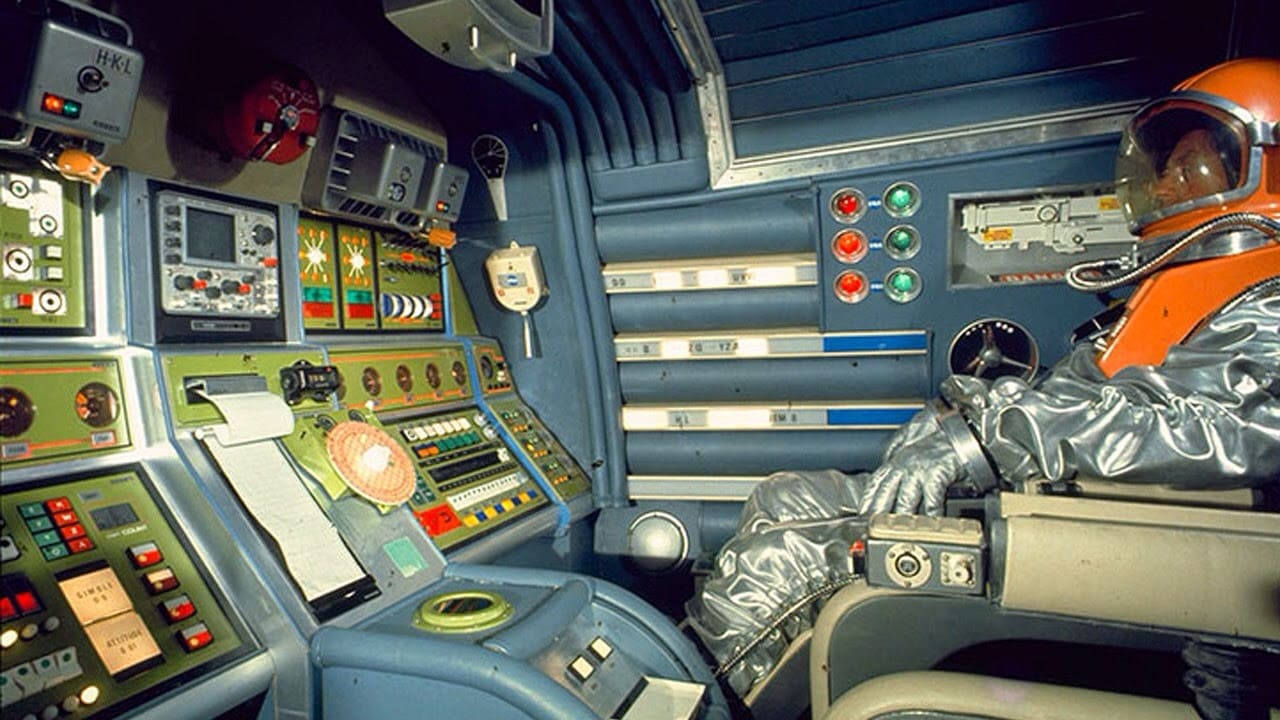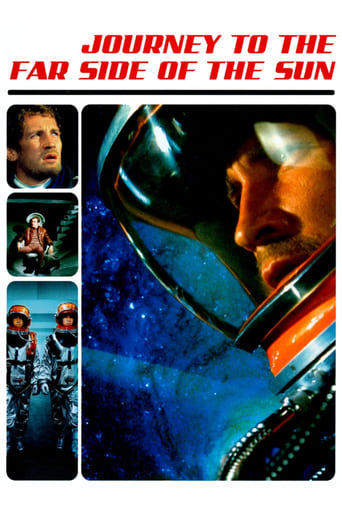

Touches You
... View MoreGood concept, poorly executed.
... View MoreCrappy film
... View MoreIt really made me laugh, but for some moments I was tearing up because I could relate so much.
... View MoreI watched this movie when I was a kid (on video in the 1980s) and it was a bit of a childhood favourite, but I couldn't remember some key points so watched it again just recently on the net. I'm disappointed, needless to say. The ending is 'too' convenient. All the evidence is destroyed in a very 'forced' accident. That being said, it's still a good movie and good science fiction, when you stop to think about it. The models are great and the casting and performances are very good, along with the music and set designs and the futuristic vision with all the nifty gadgets. All I can say about the movie philosophically is that the idea of a counter-earth is Pythagorean: https://en.wikipedia.org/wiki/Counter-Earth. Now as to the "point" the movie was trying to make. My guess, and this is only a guess, is that its about trans-Atlantic relations. You have the European space agency, led by a British guy (Jason Webb ) but with all the funding coming from the French and the Germans (who are very miserly), and the Americans only pitching in when it becomes discovered the Soviets are spying on the new find of a tenth planet (in the same orbit as Earth, but on the opposite side of the sun). The super secret nature of the mission to this new planet also stops the public knowing about the startling discovery and so all the evidence of of the new planet being an opposite copy of Earth. (This is a theme in 2001 A Space Odyssey since the Americans keep the discovery of the monolith on the moon a secret and it was the mistrust and paranoia that Hal Suffered from that made him kill of the crew of the Discovery). Note that the last scene has Jason Webb, old and senile in his mansion, crashing into a mirror when he remembers the mirror image Earth, taking the secrets with him to the grave.There's also the American astronaut hero (Colonel Glenn Ross) and his annoying country-girl wife. She makes fun of his manhood, not wanting to have kids from him, saying he's sterile because of radiation from space, only to discover she's taking birth control bills behind his back. I guess she wants a domesticated husband she can control. Contrast this to the lovely security controller from the European space agency, Lisa Hartmann, a hint that the Americans should stick it with Europe (under British leadership of course) if they want to win the Cold War and explore the solar system. It's this over commitment that gets the hero killed in the end, despite Lisa's warnings that he no longer owed Webb anything. Note the colour contrast too, with the hero's wife being a (wild) redhead and Lisa being a decent blonde!On a final plus note works of art, whatever their quality, are always ageless, gaining relevance when you least expect it. Hence the curious situation the UK is faced with now with the vote on continued membership in the EU. If you can't lead the Europeans, be a member on your own terms, you go it alone. So the movie is, tragically, quite prophetic. (Notice also the scene in Portugal, making Southern Europe look poor, primitive, not unlike the situation today with the debt crisis Spain and Greece have found themselves in).So, all in all, I'd say it's a good movie and has stood the test of time, but nothing of course compared to '2001' or 'Alien', although it's still better than Prometheus!Hope you aren't offended, Emad El-Din Aysha, a freelance movie reviewer in Egypt:
... View MoreKHQ isn't showing Carson reruns. Instead they show old movies (where I saw Mirage, Sink the Bismarck, and The Truth about Spring). Because in junior high and high school I had no life--and I loved to wriggle out of going to Mass on Sunday morning--I would watch the old flick on the weekend.Tonight's offering is Journey to the Far Side of the Sun, a production of dubious quality because of its origin, ITV or ITC or some British studio that gave us the syndicated series UFO and Space: 1999. Although those series were idiotic, JTTFSOTS (try writing that three times fast!) was just confusing, frustrating, and dull. The premise was great--there is a mirror image Earth on the other side of ol' Sol, and we send a mission (we being the European Space Command or something) to investigate--and the high concept held the viewer captive for a good part of the movie.Unfortunately, as I remember, the whole thing starts to creak and dreer its way toward a cop-out non-climax. I vaguely remember how the sound and special effects and Roy Thinnes' non-acting all dragged on the thing to an unsatisfying conclusion. I remember watching it on video tape in the 80s, and I know it hadn't improved with age. Some movies have a camp value that sustains them past their best-used-by date, but I recall that the movie just curdled.And yet, I generally have a positive feeling about the movie because I loved watching old flicks late in the evening, alone and quiet, sometimes in the family room, back in the early 70s.And then the National Anthem and a test pattern.
... View MoreCaught it on Viasat Finland having never seen it before. I'm a big fan of true sci-fi (or any sci-fi actually) and this is one of those rare ones that actually makes your brain work. It's got that eerie feel you only had in sci-fi made in the 60's and 70's (think of Planet of The Apes). All gloomy and serious, no laughs.The cast was unknown to me and the acting is a bit stiff (except for Patrick Wymark, who's character is pretty annoying). Characters look as if they came from the 60's, but that's not really a surprise or a bad thing at all.The plot is intriguing, a new planet on the other side of the sun. Propably not as effective today as it was back in the day, but it's still fun. There are a lot of illogicalities and the script is anything but tight, but there are some very effective scenes and the ending is something to remember.If they put a little more thought into details and had had somewhat tighter (and timeless) production, this would be up there with Planet of the Apes. Worth catching definitely.
... View MoreYou know those films you see as a child, the ones that stick in your memory and really make an impression, the kind of movie that when you watch it again, years later, all the original thrill and magic suddenly comes rushing back to you? This movie isn't one of those.OK, that might have been a little harsh. 'Journey to the Far Side of the Sun' certainly DID make an impression on my when I first watched it as a child, on television back in the early 1970's. The idea was--and still is--intriguing: that an Earthlike world lies on the far side of the sun, traveling in the same orbit as our world, forever hidden from our sight. And the convention of this film, that this other world is the mirror-image of ours, and possesses a double for each person here, is quite a thought-provoking notion. I'm sure that this idea really captured my imagination back when I first watched 'Doppelganger' so many years ago.But the problem with this film, is that it is sooo slow and tedious; it takes soooo long for the astronauts to get to the other world; and when we do finally discover that the other Earth is a mirror-twin of our own, not very much is really done with it. Of course, that's my feeling today as an adult viewer, after many years of watching more modern science fiction films. As a boy, I suppose I was more of a blank page, and sadly, perhaps, more willing to appreciate a film purely for its intellectual virtues. I also think the detailed minutia of spaceflight depicted in the film was probably much more interesting to viewers of that time; as a modern viewer, all I could think was "Please--just get ON with the story!" All that being said, 'Doppelganger' does have some redeeming features. The basic premise of an exact mirror-image Earth is a clever one. Many of the technical details of the future society were pretty insightful--and the model miniatures were quite nicely done, given what had to be the film's limited budget. And, certainly, as another reviewer has said, the sad and downbeat ending does actually give the film an emotional jolt, and is probably the main reason it made such an impression on me as a child. The final scene, in particular, where a broken Patrick Wymark deliberately rams his wheelchair into his reflection in the mirror, still has a haunting quality to it.But when I think of 'Journey to the Far Side of the Sun', I can't help but compare it to an episode of The Twilight Zone, called "The Parallel." That episode shows us an astronaut who returns to an Earth that's slightly different than the one he left; and rather than the idea of an reversed, mirror world, uses the idea of an alternate reality where events and history are slightly different. Although it's not one of the better Twilight Zone episodes, I think, it still carries more emotional power for me than Doppelganger, because it carries less extraneous cinematic baggage. You quickly get the concept, the story, and the protagonist's situation--and that's all.So, all in all, watching 'Doppelganger' again (through Neflix) did bring back some of the same feelings of wonder it originally inspired in me as a boy, but if you're a first-time viewer, be warned that it's tone and pacing is much slower than most modern science fiction films.
... View More